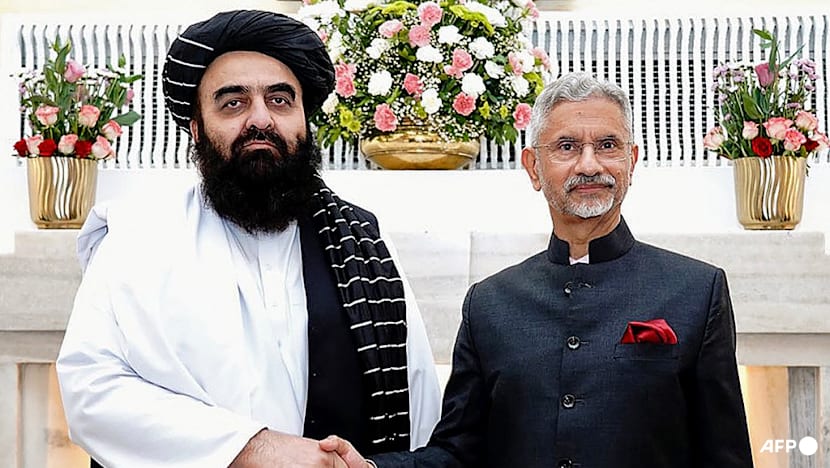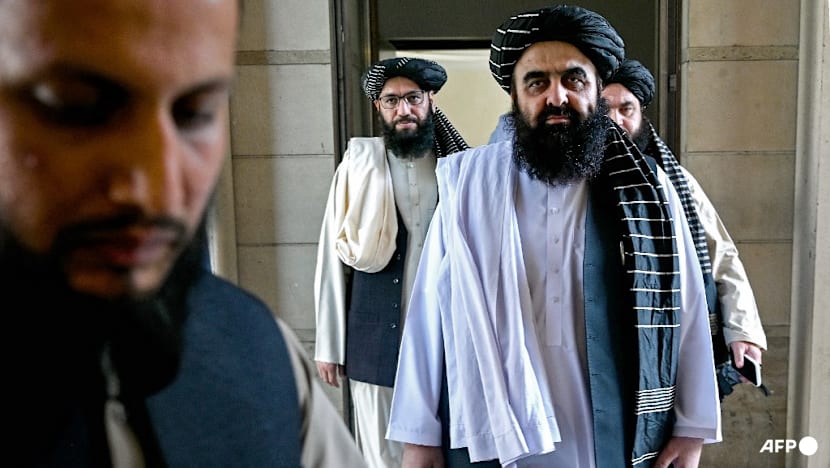Commentary: The Taliban’s visit to India marks a turning point for South Asia
The Taliban stand to gain economically through engagement with India. But what’s in it for India? Former foreign correspondent Nirmal Ghosh weighs in.

India's Foreign Minister Subrahmanyam Jaishankar (right) and his Afghan counterpart Amir Khan Muttaqi shaking hands during a bilateral meeting in New Delhi on Oct 10, 2025. (Photo: AFP/India's Ministry of External Affairs/Handout)

This audio is generated by an AI tool.
SINGAPORE: Afghanistan's Taliban Foreign Minister Amir Khan Muttaqi wrapped up a six-day visit to India this week, during which New Delhi announced an upgrade of its diplomatic mission in Kabul to a full embassy.
The visit by Mr Muttaqi is a significant move that rearranges the chess board in a volatile region and could open the gates of more tacit if not official recognition for the regime in Kabul. Analysts have suggested that closer India-Taliban ties may offer New Delhi a way to counter long-term rival Pakistan’s influence and balance China’s growing presence in Afghanistan - a country historically contested for influence by great powers.
The Taliban stand to gain economically through engagement with India, which, during the years the previous US-backed government was in power in Kabul (2004-2021), had invested some US$3 billion into Afghanistan. With the United States’ withdrawal in 2021, that relationship came to an abrupt halt, but will now resume.
Meanwhile, importantly, Pakistan - hardcore elements of whose security establishment have long backed the Taliban - is learning that it cannot take Afghanistan for granted.
Not long after Mr Muttaqi landed in New Delhi, India’s long-term rival Pakistan launched air strikes in Kabul targeting Noor Wali Mehsud, leader of the Tehrik-e Taliban Pakistan (TTP).
The TTP, with some estimates putting its strength at around 30,000, wants to overthrow the government of Pakistan in order to establish an emirate based on Islamic law. It has now become a serious security threat to Pakistan.
The Taliban, and the TTP, are essentially Pashtun nationalists. Pashtuns are Afghanistan’s largest ethnic group, followed by Tajiks, Hazaras and Uzbeks. There are Pashtuns on both sides of the Durand line, with deep family links. Islamabad accuses the Taliban of harbouring the TTP; the Taliban deny it, saying in essence that the TTP is Pakistan’s problem.
It is not clear if the strike was successful, but the Kabul attack triggered condemnation from the Taliban and retaliation by Afghan forces against Pakistani troops on the Durand Line, a 2,600km Pakistan-Afghanistan border which Afghanistan has never recognised.
The border was arbitrarily drawn in 1893 with little concern for realities and nuances on the ground, and remains porous, which has at different times well suited different players in the region’s complicated conflicts.
Pakistan and Afghanistan on Wednesday (Oct 15) agreed to a temporary ceasefire to the fighting that has killed more than a dozen civilians and left over 100 wounded.

LEGITIMACY VS REALITY
With its Indian welcome, the Taliban regime has edged closer to the wider international legitimacy it desires as the de facto rulers of Afghanistan.
Thus far, the regime has only been recognised by Russia. Afghanistan’s seat at the United Nations is still occupied by the representative of the previous government that collapsed as the US ignominiously withdrew in 2021, leaving the Taliban to sweep back to power after being kicked out by the US in late 2001 in reprisal for harbouring Osama bin Laden, mastermind of the Sep 11 terrorist attacks in America that year.
Several countries maintain diplomatic missions in Kabul, but have still not officially recognised the unelected Taliban as the legitimate government.
New Delhi’s approach has evolved to recognise that the Taliban are a reality, and India will deal with the regime, extending aid and investment and skilled manpower, while stopping short of official recognition, preferring to follow the lead of the United Nations.
The Taliban have their own cards to play. Other countries are, or may soon, enhance their engagement even if only to hedge - as is part of India’s agenda as well - against Afghanistan again becoming a hotbed for militant and terrorist groups. China and Russia, for example, worry respectively about Uighur and Uzbeki militants finding a training and staging ground as others have before in Afghanistan.
Certainly, hosting the Taliban was, to many, a bad look for India.
“I hang my head in shame when I see the kind of respect ... given to the … Taliban by those who beat the pulpit against all kind of terrorists,” the renowned Indian poet and lyricist Javed Akhtar posted on X. And the Taliban minister drew wide backlash for not inviting any women journalists to his first press conference in New Delhi; possibly in response, female journalists were invited to a second one.
But re-engagement gives India the advantage of being back with a presence in Afghanistan, cultivating goodwill and with eyes on the ground watching militant and terrorist groups - and Pakistan.
At the same time, India is not naive enough to take whatever the Taliban say at face value. But re-engagement comes at a relatively low cost; India shares cultural links, but not a land border with Afghanistan.
On their part, the Taliban know that Pakistan, which is beset with problems not least of which is the resurgent TTP, does not have the money to rebuild Afghanistan.
Also, notwithstanding that Pakistan is also an Islamic nation with which it has brotherly ties, the Taliban harbour an element of resentment against it for manipulating and taking Afghanistan for granted. In that context, engaging with India balances a Pakistan whose security establishment tries to control outcomes in Afghanistan.
OUTFLANKED
Pakistan - whose security establishment has always regarded Afghanistan as part of its so-called “strategic depth” which it could retreat to if India overwhelmed it - has been somewhat outflanked.
Pakistan’s error was in presuming that the Taliban would always be on its side. But as an old saying goes, “you may be able to rent an Afghan, but you cannot own an Afghan”.
Back in July 2021, Husain Haqqani, author and former US Ambassador to Pakistan and now a Senior Fellow at the Anwar Gargash Diplomatic Academy in Abu Dhabi and also at the Hudson Institute in Washington DC, presciently warned in an article in Foreign Affairs that Pakistan was getting what it wished for but would come to regret it.
“A Taliban takeover will leave Pakistan more vulnerable to extremism at home and potentially more isolated on the world stage,” he wrote.
Pakistan first supported the most hardline Islamist elements of the Afghan Mujahideen while fighting the Soviets, and when the Soviets left (in early 1989), Pakistan chose their own favourites, the Taliban, he told me.
“The Taliban ended up having Pakistani Taliban or Pakistani Islamist allies. Now these Pakistani Taliban believe that if Afghanistan can have an Islamic Emirate, why can't the Pashtun areas of Pakistan? So now they have become a challenge to the Pakistani state,” he said.
“The Pakistani state now wants the Afghan Taliban to abandon their ideological kin to support Pakistan's national security objectives - and the Afghan Taliban are not willing to do that.”
UNITED STATES NOT WELCOME
Ironically, there is one issue all the countries in the region, including India and Pakistan, agree on - that the US should not return to Bagram air base, which it evacuated in 2021 and which US President Donald Trump says he wants back.
“If Afghanistan doesn’t give Bagram air base back to those that built it, the United States of America, bad things are going to happen!” Mr Trump said last month.
But nobody is happy with the thought of having an American military base in Afghanistan again.
The Taliban are having none of it, and they are not alone. In Moscow on Oct 7, officials from Russia, India, Pakistan, China, Iran, Kazakhstan, Tajikistan, Uzbekistan and Kyrgyzstan in a joint statement called “attempts by countries to deploy their military infrastructure” in Afghanistan and neighbouring states “unacceptable”.
The bottom line is that India’s embrace of Mr Muttaqi signals that Afghanistan is back again in focus and being courted as a country at the geographical crossroads of history.
The wider region - central, south and west Asia - remains nervous but will try to stay on the good side of the de facto regime in Kabul, even as they are well aware that Afghanistan is both volatile, and has historically been a graveyard of superpowers.
Nirmal Ghosh, a former foreign correspondent, is an author and independent writer based in Singapore. He writes a monthly column for CNA, published every third Friday.


















